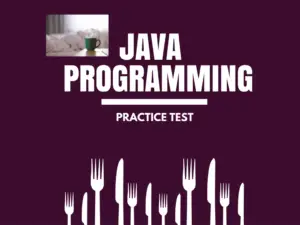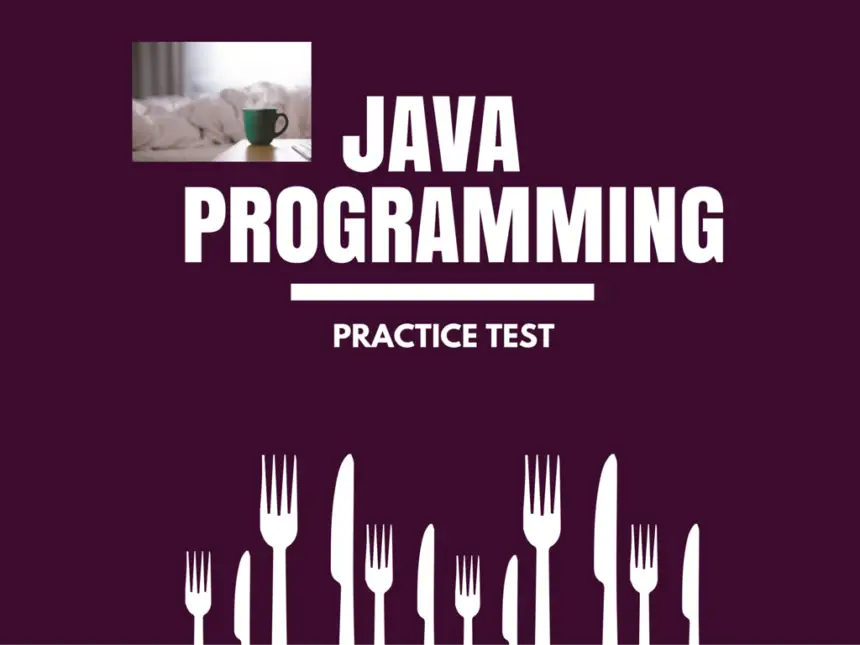Welcome readers, we’ve brought you an entirely new Java programming practice test to polish your Java coding skills. The aim of this Java quiz is mainly to test your coding skills and logical ability. We have powered this quick Java online test with the top Java coding questions.
We’ve selected the programming questions after ensuring their quality and competency level. If any of you’ve just started learning Java and want to evaluate the core Java skills, then go through this quiz. It’ll help you strengthen your grasp of the language.
Java Programming Practice Test

Note: You can see all the answers at the end of this quiz.
We hope this Java programming practice test will help all aspiring software developers and testers learn and find confidence in their Java coding skills. Subsequently, we suggest you not just stop after the quiz but instead, check out some other amazing quizzes and tutorials on Java/Python/Selenium and related programming articles on our blog.
More Java Quizzes:
Recommended Java Tutorials:
We firmly believe in sharing knowledge and listening to our readers. We request you provide feedback, ask questions, and tell us what you think. To make the most of this Java quiz, we’ve some basic yet important Java programming concepts to share with our readers.
General Java Questions and Answers:
1. What is JVM? Why is Java called the ‘Platform Independent Programming Language’?
JVM, or the Java Virtual Machine, is an interpreter which accepts ‘Bytecode’ and executes it. The Java Compiler (javac) produces ‘Bytecode’ which itself is not executable.
It requires the Java Virtual Machine (JVM) for execution. The translation into Bytecode makes a program compatible with running on many platforms.
2. What is the Difference between JDK and JRE?
- JDK is the short form for the Java Development Kit. It provides you with resources to create Java-based software.
- JRE is the Java Runtime Environment. It is responsible for running the Java programs.
3. What does the ‘static’ keyword mean?
The static variable in Java is associated with a class, not with the objects of the class. It gets allocated during the loading of the class.
Similarly, a static method belongs to a class, not to the class object. A static method can be called directly by the class name.
4. What do you understand about Autoboxing and Unboxing?
The automatic conversion of primitive data types into a similar Wrapper type is known as autoboxing. If the conversion goes the other way, then we call it unboxing.
5. What is the difference between Errors, Unchecked Exception, and Checked Exception?
- An Unchecked Exception inherits from the RuntimeException. JVM has to handle them.
- A Checked Exception inherits from the Exception class and requires Java code to handle it.
- Errors usually occur in the case of more severe problems like the OutOfMemoryError (OOM). These may not be so easy to handle.
6. What is the difference between Throw and Throws in Java Exception Handling?
The throw keyword raises an Exception whereas the throws keyword specifies that a method can throw an exception.
Quick Java Programming Tips:
1. Always return empty Collections and Arrays instead of null.
While returning a collection element or an array, a method should always return it as empty instead of null. It will save a lot of if-else checks for null elements.
2. Prevent creating useless objects and prefer Lazy Initialization.
Object creation in Java is one of the costlier operations in terms of memory usage and performance impact.
3. Never declare an instance field of the class public.
A suitable approach is to make the field private and provide getter/setter methods to manage the elements.
4. Always try to reduce the Mutability of a class.
Excessive immutability can hit the performance of your Java application. Firstly, check whether you need the class to be immutable or not. Then apply the same tactics while adding the members to the class.
5. Always try to minimize the scope of a local variable.
Restricting the scope of a local variable will make the code more readable, less error-prone, and improve maintainability.
See what Linus Torvalds the founding father of Linux has to say about Programmers.
Most good programmers do programming not because they expect to get paid or get adulation by the public, but because it is fun to program.
All the Best!









